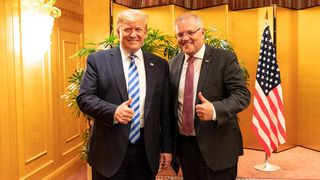Like the rest of the world, Australians’ interest in American politics has spiked under the Trump presidency. Trump’s unconventional style garners no shortage of media attention, both in the United States and in Australia.
The majority of Australians stand to be disappointed. Polling of Americans suggests 2020 could be a close contest. Perhaps much closer than many Australians appreciate.
This attention is not merely driven by spectacle. The substantive direction of American foreign and economic policy during Trump administration is of enormous consequence for Australia. The US is Australia’s largest source of foreign investment, the largest destination for Australian investment abroad, and Australia’s most important ally.
For these reasons, Australia’s interest in US politics is not just the byproduct of another American cultural export. Although they cannot vote in the 2020 US election, Australians have "skin in the game". The turbulence of the Trump presidency reminds us that the decisions made by an American president can have profound consequences for Australia.
In late July, the United States Studies Centre and YouGov polled 1,820 Australians and 1,800 Americans. We find Australians strongly prefer a Democratic win in 2020, a result replicated across almost all demographic and political groups.
Only about one in five Australians prefer a second term for the Trump administration. Indeed, fewer than one third of Coalition voters want the president re-elected. Support for a Democratic president ranges from 41 per cent among all Australians, and 53 per cent and 57 per cent among Labor and Greens voters.
Only about one in five Australians prefer a second term for the Trump administration.
Men and women in Australia are equally supportive of a Democratic win (41% each). Men are twice as likely to prefer a Trump win, 26 per cent to 13 per cent. Across age groups, there is little variation, with 43 per cent per cent of those aged 18-29 and 65 and older preferring a Democratic win. Just 14 per cent of the younger group prefer a Trump win, compared with the 24 per cent of the older group.
We also find a large number of voters who say they would prefer another candidate, or who are not sure (both options chosen by one fifth of Australian respondents). This may reflect uncertainty about American politics, unhappiness with the Republican candidate, or unwillingness to support an unnamed Democratic candidate.
Whatever the case, the majority of Australians stand to be disappointed. Polling of Americans suggests 2020 could be a close contest. Perhaps much closer than many Australians appreciate. Using a series of survey experiments about 2020 voting intentions, we found president Trump trailed three leading Democrats (Kamala Harris, Joe Biden and Elizabeth Warren), but only by a few points. He was tied or ahead of the other four Democrats we asked about.
Recent US political history reminds us that obtaining a popular vote majority does not guarantee electoral victory, and national polls showing Democrats leading Trump need to be interpreted cautiously.
The president is elected by the Electoral College, decided by the aggregate result of discrete state-based contests. Donald Trump won the presidency in 2016 despite winning three-million fewer votes than Democrat Hillary Clinton. It is very possible this result will be repeated in 2020, and once again the leadership of Australia’s closest ally and the largest and wealthiest Western democracy, may hinge (in part) on a few states in the American mid-west. Whatever the result, it will likely have profound consequences for Australia, the rest of Asia-Pacific and the world.







